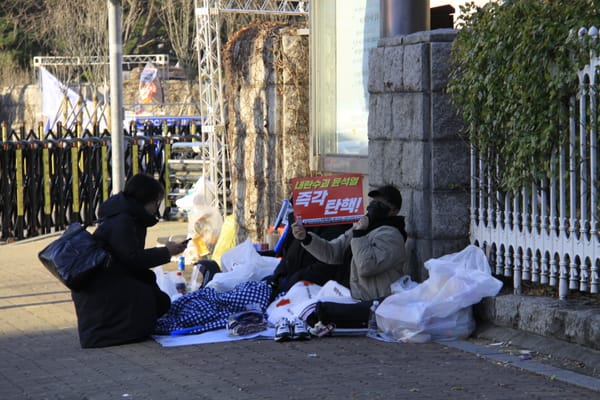Asia Undercovered #10: Protests in Indonesian Papua & Democracy in Asia
Asia Undercovered: Journalist Nithin Coca's weekly roundup of the news, events, trends and people changing Asia, but not getting enough attention in the US media.
Undercovered this week
Mongabay and three other outlets published this extensive expose on how a secret deal could destroy Indonesia’s last remaining large, untouched rainforest in Papua. Well worth a read.
Indonesian Papua was also the site of several large protests last week, around the anniversary of the region’s annexation. This explainer by Connor White in New Naratif does a great job in illuminating the Papua conflict, why the region remains under military occupation, and its importance both regionally and globally.
The Japan Times went out of its way to say it would no longer be using the terms “comfort women” to refer to World War II era sex slaves, or “forced labor” to refer to...forced laborers. The backlash has, not surprisingly, been considerable.
In the midst of the ongoing (and likely worsening) human rights crisis facing Muslims in Xinjiang, Gerald Roche, Lhadon Tethong and Kate Saunders wonder if the equally worrying situation in Tibet is being forgotten (ChinaFile).
Sad news as Palden Gyatso, a Buddhist monk who was jailed for 33 years after China’s illegal invasion and annexation of Tibet, died at the age of 85. His biography, Fire Under the Snow, is one of my favorite books, a sad but heroic tale.
Josy Joseph writes for The Caravan about the worrying state of investigative journalism in India, where “the culture of the newsroom has degenerated slowly, and self-censorship has become second nature to young journalists.”
You probably heard about the American missionary killed in the Andaman Islands. But you probably haven’t heard much about the tribe itself, or the importance of indigenous peoples in Asia. In this op-ed, Brahma Chellaney argues for greater protection for indigenous peoples for the sake of not only their culture, but the environment too. (Nikkei Asian Review)
The rally I mentioned in last week’s issue took place in Malaysia. And it resulted in the new government withdrawing plans to ratify a United Nations convention against racial discrimination which was skewed as being anti-Malay (Reuters).
Food for thought
This interesting piece in Power 3.0 argues that India should lead on promoting Democracy across the Asia Pacific if it truly wants to counter China. While a noble argument, it seems to be thinking of an India from the past, ignoring the fact that democratic norms have suffered under the rule of the increasingly authoritarian, right-wing Narendra Modi government. In fact, next year’s elections could be a de-facto referendum on India’s democracy.
We need an Asian democratic front to counter rising fascism, nationalism, and authoritarianism, but with the US mostly out of the picture, who can lead on this? It’s a worrying state when arguably the most vibrant democracy in the continent, Taiwan, isn’t even recognized as a country by any of its neighbors.
Until next week,
Nithin
Was there a story I missed? Respond to this email or tweet at me and let me know so I can include in next week’s newsletter.



